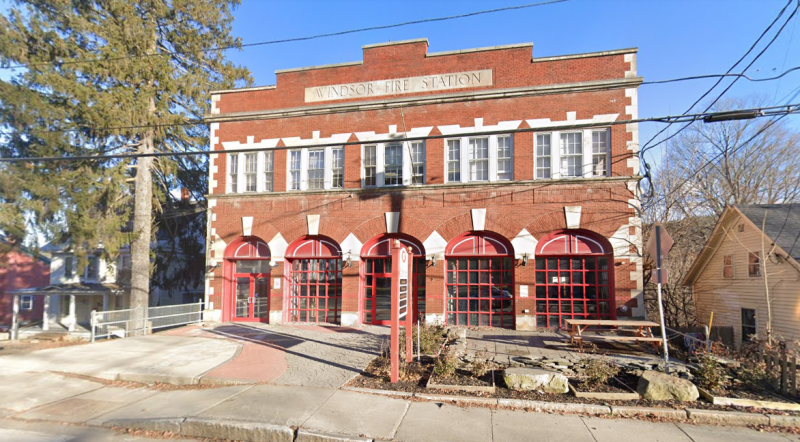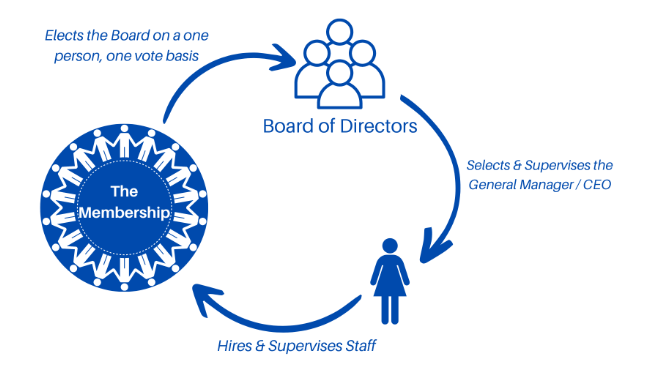
In the basement of the old firehouse on Main St. in Windsor, Vermont, a worker-owned cookie-baking cooperative is carrying on a legacy of local artisanal baking. Covered Bridge Cookies, cherished by locals since Carl Goulet started baking butter, flour, and chocolate into cookies to sell at the Windsor farmer’s market in summer of 1993, now offers the same cookies that Vermonters and tourists alike have come to love, but under a new form of ownership, a worker cooperative.
In a couple of ways, this was far from the most likely outcome after Carl decided he was done baking cookies. Fewer and fewer small business owners are finding their family members willing to take over the family business when they’re ready to retire, so Covered Bridge Cookies is in the minority of businesses that are able to pursue that path. Even more unlikely, Carl’s son Christopher Goulet teamed up with Shannon Smith and Colin Moon, who both knew the business well, and the three decided to take on its ownership together by converting it to a worker cooperative. In late winter of 2023, the new worker-owners announced the formation of the co-op and its purchase of Covered Bridge Cookies, marking the start of a new chapter for the business.
Under the new ownership structure, the cooperative will serve to benefit both present and future employees. Unlike in a general partnership, a core feature of a worker co-op is the opportunity for new full-time employees to become eligible for ownership after an initial period of working for the business. Employees that pursue this opportunity pay a fixed price for a share in the cooperative and are then entitled to a share in profits and an equal say in key decisions.
The co-owners at Covered Bridge Cookies will also benefit from the flexibility to structure and restructure business operations with or without managers that oversee the work of others. Many co-ops, often but not always those with fewer employees, choose to operate without hierarchy, giving each employee greater autonomy over their work. Others prefer to appoint managers that are responsible for supervising and hiring staff, a form of circular governance illustrated in the graphic below.

Now that Covered Bridge Cookies has been operating as a cooperative for the better part of a year, we decided to sit down with Christopher, Carl’s son and co-owner of the co-op to discuss the motivations behind the conversion to worker ownership and how it’s going so far.
What’s the abbreviated history of Covered Bridge Cookies?
CG: The business is 30 years old and was the brainchild of my mother and father. They grew it from the farmer's market and eventually moved it to a real facility and location in Windsor, where we grew up. So the Cookie Company has always been part of the fabric of how we as a family exist in this town. This is where my dad worked. My mom worked at the big hospital in town, and I used to call her the mayor; she was the central fixture, I think, in the communications of the entire town. And so being the “cookie people,” bringing cookies to various events and dinners – it's all part of the history of my family. But time moves along, and 30 years is a long time to bake or do anything. And my parents definitely deserve some time to chill out and hang with their granddaughter a little bit. But they didn't know what to do. They thought they were just going to slowly wind it down and ride it off into the sunset and that'd be that.
But that didn’t happen. Why not?
CG: So when my partner and I sort of decided we'd actually really like to do this – to take this over and convert it into a cooperative, they were really happy. They didn't quite get the co-op part at first, but they got on board eventually. And in going through this process, which was long, I realized there were points along the way that if we hadn’t made this decision, they would have let the business go. It would have disappeared and been ridden off into the sunset, especially recently when we had some equipment failure, that probably would have been the end.
You mentioned an equipment failure, a big challenge for new owners to deal with. What about staffing, which is a challenge we hear about a lot with Vermont’s small businesses?
CG: When my parents sold the business to us, there were two jobs – my dad and myself. Today there are five. That's a couple months later. That's a quicker effect. So I think that that's pretty indicative of the model of collaborative power and what people are capable of when we work in a manner that is non-confrontational and non-hierarchical, and instead incentivize each other to take care of each other. It helps that our cookies are really good and demand is through the roof, too. But there are more people working here today than I've ever seen in the 30-year history of the company. And we still need help.
By the way, it's complete nonsense that nobody wants to work anymore. We set our pay scale very simply – the deal is we'll give you a living wage, starting at $25 an hour, and you're guaranteed a four-hour minimum. Depending on the amount of work, you'll at least get four hours for a call-in. And we have people banging down the doors to work with us. To me, that also shows that our focus on quality of life and on giving back to the community and being part of the community – I think it shows that people want to be part of that project and want to see it succeed.
There are currently three worker-owners; are the other two employees interested in becoming owners of the co-op?
CG: The other two employees are on the program and have expressed desire to do so. In our bylaws, we stated that wanted members to get some time just to make sure that we all work well together and are cool and to at least become trained on most of the positions so that you have a good understanding of the mechanics of the whole business. But they're on board with that and are making moves to do that. Which is amazing to see.
And those new workers have had some of the best ideas that have come out of the group in the last couple of weeks. New ideas and perspectives are able to bring new processes that actually have saved us time and increased our efficiency quite a bit, actually. So it's cool to see the immediate benefit of collaboration.
How long do employees need to work for the business before being eligible for membership?
CG: It's a year. And the reason we chose a year is that we make a product that is very affected by the environment. How flour and butter and the amount of liquid in dough reacts to ambient humidity and temperature is part of the craft of it, and you can't learn how to make these cookies until you've kind of been through every season. You have to get the gist of adjusting small details to create the same product no matter how hot and humid or cold and rainy or snowy it is.



